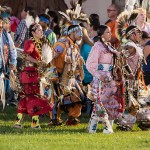
“For the Native community here, Indigenous Peoples Day means a lot. We actually have something,” Nick Estes of Albuquerque, who is co-ordinating a celebration on Monday after the city council recently issued a proclamation, told the Guardian. “We understand it’s just a proclamation, but at the same time, we also understand this is the beginning of something greater.” Countries have dealt with their colonial pasts in various ways, with Australia simply instating a National Sorry Day to apologize for the Australian government’s treatment of Aboriginal peoples. Still, some say the celebration of Columbus Day is important despite the problematic aspects of colonialism. Anna Vann told USA Today, “It’s a celebration of when the Europeans came over and started their lives here. We wouldn’t be where we are today if it weren’t for this history.”
#IndigenousPeoplesDay #ColumbusDay #Indigenous






